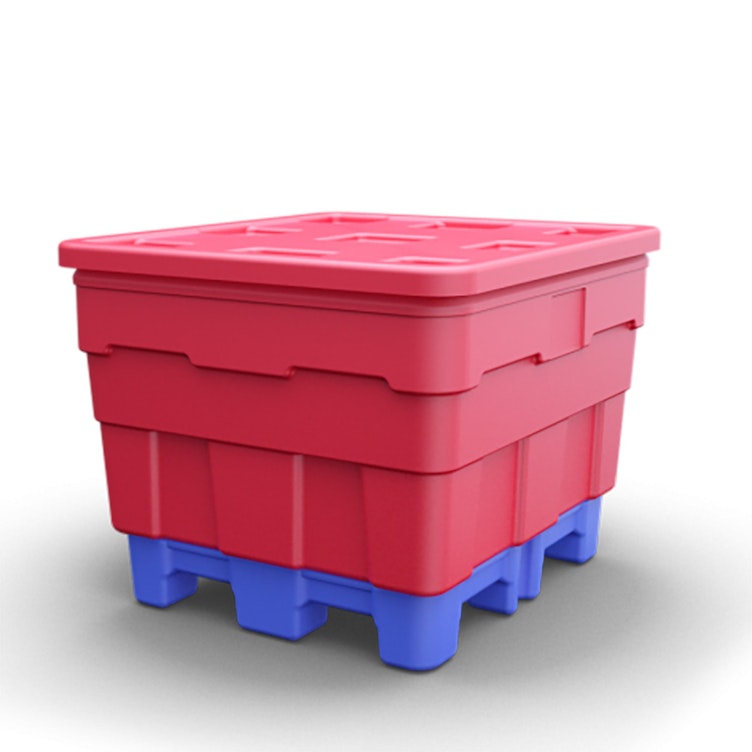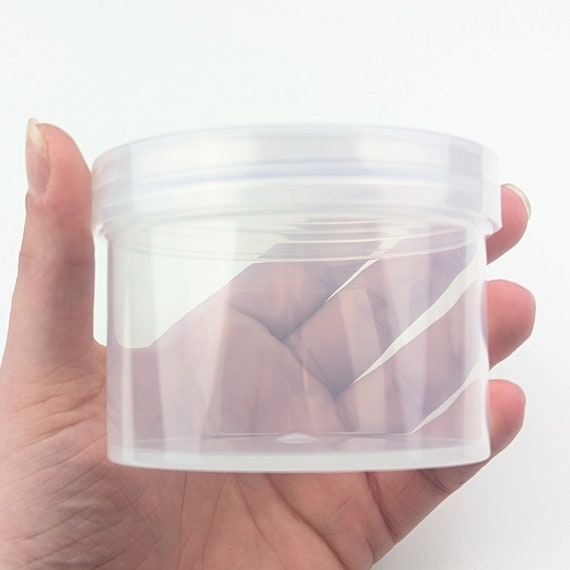Explore smart uses of plastic bulk containers in various industries
Wiki Article
A Comprehensive Guide to the Various Kinds of Mass Plastic Containers Available Today
Bulk plastic containers play a vital duty in numerous markets, using options for storage space and transport. Their diverse types cater to various demands, from inflexible choices for solid materials to flexible containers accommodating numerous forms. Each kind provides distinct advantages, making it important to understand their applications and attributes. As markets progress, so do the demands for efficient container remedies. What variables should one think about when choosing the right mass container?Introduction of Bulk Plastic Containers

Kinds Of Bulk Plastic Containers
Bulk plastic containers been available in numerous forms, each suited to particular applications. Stiff bulk containers, versatile mass containers, and intermediate mass containers stand for the key categories, each offering unique advantages. Understanding these types is vital for choosing the ideal container for transferring and storing products.
Stiff Bulk Containers
Stiff bulk containers are vital for reliable storage space and transport of different materials across industries. These containers are generally constructed from resilient plastics, allowing them to withstand harsh handling and ecological problems. They can be found in different sizes and shapes, including totes, bins, and drums, making them appropriate for storing everything from granular materials to fluids. Stiff containers frequently include enhanced walls and protected covers, making certain the components remain shielded throughout transit. Their stackable design makes the most of storage room, making them suitable for storehouses and manufacturing centers. Furthermore, many inflexible bulk containers are multiple-use and recyclable, contributing to sustainability efforts. Generally, their toughness and versatility make stiff bulk containers a crucial component in supply chain procedures.Flexible Mass Containers
Flexible mass containers, frequently described as flexible intermediate mass containers (FIBCs), offer as a flexible solution for delivering and storing a selection of completely dry products. These containers are usually made from woven polypropylene and are made to be lightweight yet solid, allowing for effective handling and piling. Their flexibility allows them to accommodate different sizes and shapes, making them appropriate for items varying from grains to chemicals. FIBCs can be geared up with attributes such as spouts for easy filling and discharge, along with protective finishings for boosted resilience. Furthermore, they are reusable and recyclable, contributing to lasting techniques in sectors like agriculture, food processing, and building and construction. On the whole, flexible bulk containers provide a efficient and affordable choice for bulk product administration.Intermediate Mass Containers
Intermediate bulk containers (IBCs) are essential for the efficient transport and storage of liquids and granular materials across different markets. These containers typically have a capability ranging from 275 to 330 gallons and are created for simple piling and managing. Made from long lasting products like high-density polyethylene or steel, IBCs supply exceptional security versus contamination and environmental elements. Their style includes features such as an integrated pallet for forklift accessibility and a detachable top for simple filling and cleaning. IBCs are widely made use of in chemical, food, and pharmaceutical fields, making certain conformity with security policies. Their flexibility and reusability make them an economical service for bulk storage space and transportation, contributing to supply chain performance and sustainability.Attributes and Advantages of Bulk Plastic Containers
Mass plastic containers are crucial devices in various industries, supplying a mix of sturdiness and practicality. These containers are created from high-grade materials, making them resistant to influences, chemicals, and environmental factors. This toughness guarantees item security during storage space and transportation.In addition, bulk plastic containers are lightweight, promoting ease of decreasing and handling delivery costs. Their stackable layout optimizes storage performance, allowing for maximized storage facility room. Numerous versions feature safe covers or closures, supplying an airtight seal that avoids and maintains contents contamination.
In addition, bulk plastic containers are recyclable and commonly reusable, adding to lasting practices. Their adaptability permits a broad array of applications, from food storage space to industrial usage, enhancing their worth throughout sectors. Services gain from the lengthy lifespan and low upkeep demands of these containers, making them a cost-efficient solution for both short-term and long-term needs.
Industries That Utilize Bulk Plastic Containers
Various industries benefit from using bulk plastic containers, each leveraging their special residential or commercial properties for particular applications. The food and beverage market relies upon these containers for risk-free storage and transport of products, while the chemical manufacturing sector utilizes them for handling hazardous products. In addition, the pharmaceutical circulation requires emphasize the significance of toughness and tidiness in packaging services.Food and Beverage Sector
As the need for effective and risk-free storage space services remains to climb, the food and drink market increasingly depends on mass plastic containers for their operational needs. These containers give durable, lightweight, and functional choices for storing active ingredients, ended up products, and waste products. Made from food-grade products, they guarantee conformity with health and wellness and safety criteria. Different designs, such as stackable containers and tote boxes, maximize area during transport and storage, boosting logistical effectiveness. In addition, the openness of some bulk containers permits easy supply management, lowering the danger of spoilage. With the market's concentrate on sustainability, lots of manufacturers are currently providing reusable and recyclable alternatives, aligning with green methods while fulfilling the high demands of food security and health.
Chemical Manufacturing Field
The chemical manufacturing market counts heavily on mass plastic containers for the secure and efficient storage of basic materials, intermediates, and ended up products. These containers are created to withstand different chemicals, making certain that dangerous products do not leakage or degrade the container itself. Typical kinds consist of high-density polyethylene (HDPE) and polypropylene containers, which provide exceptional chemical resistance and longevity. Their lightweight nature and stackable style assist in transport and storage space, optimizing space in producing centers. In addition, many bulk plastic containers include functions such as tamper-evident seals and easy-to-read labeling, boosting safety and compliance with market laws. Overall, bulk plastic containers are important to the chemical production procedure, giving reliable solutions for dealing with diverse compounds.Pharmaceutical Distribution Requirements
Pharmaceutical distribution depends on bulk plastic containers to fulfill rigorous safety and security and governing needs. These containers are crucial for saving a selection and moving of pharmaceutical items, consisting of active pharmaceutical components (APIs) and finished medications. Their layout warranties security against light, wetness, and contamination, maintaining the honesty of delicate materials. Additionally, bulk plastic containers are certified with industry requirements such as Great Manufacturing Practices (GMP) and are typically made from materials that are FDA-approved. Using these containers boosts effectiveness in the supply chain, enabling for safe, large distribution while minimizing waste. Firms in the pharmaceutical market prioritize making use of long lasting, leak-proof, and tamper-evident containers to assure product safety and top quality throughout the logistics process.Factors to consider for Selecting the Right Container
When selecting the ideal bulk plastic container, numerous aspects must be meticulously evaluated to guarantee suitable functionality and safety and security. The nature of the materials to be saved is critical; compatibility with the container's product can influence honesty and safety. Bulk Plastic Containers. Furthermore, the container's size and shape have to line up with the storage space and transportation demands, ensuring effective room utilizationTons ability is another essential consideration, as it ought to suit the weight of contents without danger of damages or failure. The style attributes, such as venting or lids, can influence usability and gain access to. Conformity with industry policies is crucial, especially in markets like drugs, where safety requirements are stringent.
The expected life expectancy and toughness of the container ought to be evaluated to verify it fulfills the functional demands without frequent replacement. By assessing these elements, one can pick one of the most ideal mass plastic container for particular applications.
Environmental Effect and Sustainability
As services increasingly focus on sustainability, the ecological impact of mass plastic containers has actually come under analysis. These containers, often made from materials such as polyethylene or polypropylene, add substantially to plastic waste otherwise taken care of appropriately. Their manufacturing entails the usage of nonrenewable fuel sources, which can cause raised greenhouse gas exhausts. Nevertheless, developments in recycling technology and the development of biodegradable choices are aiding to alleviate these issues.Moreover, several makers are embracing practices that stress the use of recycled products, consequently decreasing the need for virgin plastics. The toughness of mass plastic containers additionally contributes; they are created to be reused multiple times, which can lessen their overall ecological impact when compared to single-use choices. Inevitably, the industry faces the obstacle of stabilizing performance with eco-friendly duty, making lasting techniques crucial for the future of mass plastic containers.
Ideal Practices for Storage and Transportation
Reliable storage space and transportation of mass plastic containers considerably influence both operational performance and sustainability. To make the most of room, companies need to pile containers securely, assuring security and preventing damages. Correct labeling is crucial for simple identification, which improves retrieval procedures. Furthermore, keeping a clean and organized storage space area minimizes the threat of contamination and enhances safety and security.For transportation, picking the ideal automobile is vital; containers must be safeguarded to prevent changing throughout transit. Business need to additionally consider utilizing pallets to promote much easier loading and discharging. Normal inspections of containers for wear and tear can prevent pricey substitutes.
Temperature control is an additional essential aspect, as extreme conditions can endanger the honesty of the plastic. Ultimately, training employees on best techniques for dealing with and transport guarantees conformity and advertises a society of safety. By executing these ideal practices, organizations can boost their operational efficiency while adding to environmental sustainability.
Regularly Asked Inquiries
Exactly how Do I Tidy Bulk Plastic Containers Properly?
To clean bulk plastic containers efficiently, one need to rinse them with cozy water, utilize a mild detergent and scrub with a soft brush. Rinse completely, after that enable to air dry totally before storage space or reuse.What Is the Life-span of Bulk Plastic Containers?
The life-span of mass plastic containers generally varies from 5 to ten years, depending upon the material, use, and environmental conditions. Correct maintenance and storage space can considerably expand their use and longevity gradually.Can Bulk Plastic Containers Be Customized?

Do Mass Plastic Containers Have Service Warranty Options?

Exist Rules for Using Bulk Plastic Containers?
Yes, laws exist for using bulk plastic containers, mainly focused on safety and security, ecological influence, and material compliance. These guidelines guarantee that containers satisfy sector requirements and are ideal for transporting numerous substances safely and efficiently.Rigid bulk containers, flexible mass containers, and intermediate mass containers represent the primary Bulk Plastic Containers groups, each offering one-of-a-kind benefits. Flexible bulk containers, usually referred to as flexible intermediate mass containers (FIBCs), serve as a functional remedy for keeping a range and transferring of completely dry products. The chemical production sector relies heavily on mass plastic containers for the efficient and secure storage of raw products, intermediates, and completed items. Bulk Plastic Containers. These containers are developed to stand up to numerous chemicals, guaranteeing that hazardous materials do not leakage or weaken the container itself. Additionally, bulk plastic containers are compliant with market criteria such as Excellent Manufacturing Practices (GMP) and are usually made from materials that are FDA-approved
Report this wiki page